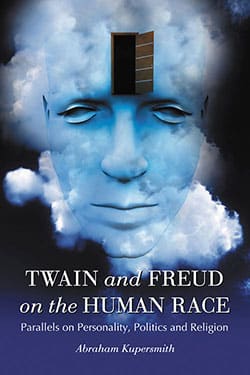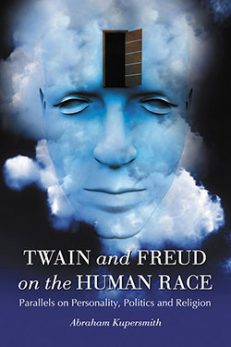Twain and Freud on the Human Race
Parallels on Personality, Politics and Religion
Original price was: $39.95.$31.99Current price is: $31.99.
In stock
About the Book
This work explores the psychological insights and theories of Mark Twain and Sigmund Freud. Though at first glance these two men seem to constitute an unlikely pairing, each formulated a comprehensive theory of individual and group psychology and subsequently applied that understanding to the realms of religion, morality, patriotism and politics.
After an extensive overview of each man’s approach, the author examines the effect of this reading of Twain’s understanding of human psychology on Twain studies and on our own sense of contemporary events.
About the Author(s)
Bibliographic Details
Abraham Kupersmith
Format: softcover (6 x 9)
Pages: 215
Bibliographic Info: bibliography, appendix, notes, index
Copyright Date: 2009
pISBN: 978-0-7864-3306-3
eISBN: 978-0-7864-5244-6
Imprint: McFarland
Table of Contents
Preface 1
Introduction 3
I Two Models of Human Nature 9
“What Is Man?” and Freud’s Structural Model of Personality
II The Creation of Character 25
The Role of Circumstance in “The Turning Point of My Life”
III Civilization and Group Psychology 32
Herd Behavior in “The United States of Lyncherdom” and The Adventures of Huckleberry Finn
IV Character and Civilization 41
The Five Worlds of The Adventures of Huckleberry Finn
V The Relationship Between Temperament and Training 58
Social Ideology in “The Man Who Corrupted Hadleyburg”
VI Race and Temperament 73
Personality and the Ideology of Race in Pudd’nhead Wilson
VII Religion and Civilization 88
The Democratic Demagogue in Christian Science
VIII History and Character 100
Temperament and Training in Two Historical Periods: A Connecticut Yankee at King Arthur’s Court
IX Politics, Patriotism, and Leadership 117
The Democratic Leader in Personal Recollections of Joan of Arc
X Leadership, Ideology, and the Church 126
Temperament and Religion in the Eseldorf Version of “The Mysterious Stranger”
Conclusion 137
Afterword 143
Appendix: “What Is Man?” 145
Notes 191
Bibliography 199
Index 203





